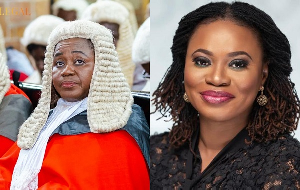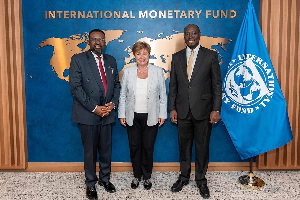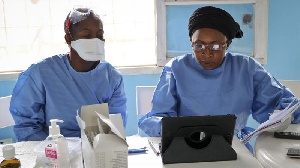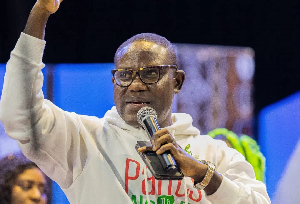There is a consensus among educated Ghanaians now that the Preventive Detention Act (PDA) of the First Republic was inimical to the democratic evolution of our country. Many are those who argue that given the standards of the time and the political milieu of the late 1950?s and early 1960?s the Act was a necessary evil. This group is made up mostly of Nkrumaists who sincerely subscribe to the belief that Nkrumah perforce had to resort to such a draconian law to safeguard not only his person but the country at large. Others however, argue passionately that the exigencies of the period did not warrant such offensive and repressive Act. To this school of thought the Act was a sword in the hand of a budding autocrat who wielded it ruthlessly and indiscriminately to stifle all genuine opposition. Was the PDA a shield or a sword?
Now here are the facts and the truth and not the myths and the fiction. At the dawn of Ghana?s independence, there was only one nation-wide political party and a constellation of parochial and sectional parties. The position of the national party was unassailable. It was popular and dominated the political scene thereby. That party was the Convention People?s Party (CPP) under the dynamic and charismatic leadership of its founder, Kwame Nkrumah. Among the sectional parties were the National Liberation Movement (NLM), headquartered in Kumasi, under the leadership of Bafour Osei Akoto, the chief linguist of the then Asantehene, Sir Osei Agyeman Prempeh; Moslems Association Party under the leadership of Awoonor Renner; Northern Peoples? Party (NPP), led by Chief S.D. Dombo and Togoland Congress Party under the tutelage of S. G. Antor. All these parties and many others were at the market place competing for votes with specific groups being their targets.
Even though the unquestioned overall dominance of the CPP was palpable, there were some areas in the country that it had to fight strenuously for votes if not for survival. The Ashanti Region (including the present day Brong Ahafo) was such an area. Here the fundamental differences in policies and the vision of the CPP Vis a Vis the sectional parties were in sharp focus. The CPP espoused unitary form of national government. The Kumasi-headquartered NLM, with perhaps behind the scenes blessing of the Asantehene, zealously campaigned for a federal form of government. Instead of force of argument being the modus operandi, argument of force was unleashed. Arson, violence, political intimidation resulted. Such was the fervor and the intensity of the ensuing mayhem that it was considered suicidal for Nkrumah to visit Kumasi. But Nkrumah did visit Kumasi and the CPP held rallies in political. It was not only in the then Ashanti Region that the indomitable CPP had to run fast to keep its position.
Akim Abuakwa District of the then Colony was another area. Here, the local CPP under the leadership of Aaron Ofori Atta had to contend with opposition titans like J. B. Danquah, the doyen of Ghana politics and William Ofori Atta. Like in the Ashanti Region, this district also had its fair share of political violence and intimidation. Despite the existence of these two pockets of uncharacteristic violence, the whole political scene was generally as exciting as stimulating.
On attainment of independence, as if by hindsight, the GaDangmes decided to form a political party of their own with passionate enthusiasm. The Ga Shifimo Kpee (Ga Steadfast Party) was born. Ashie Nikoi and Dzenkle Dzewu, two leading members of Shifimo Kpee had earlier served on the seven-member Central Committee of the CPP. Then as now, the GAS perceived they were not only being overwhelmed by ?strangers? but were not having their fare share of the national pie. The Shifimo Kpee hit the scene with a bang and melodrama. Besides the eye-catching red color of the party, it spawned a gang-like outfit known as ?Tokyo Joe?. To dilute the Shifimo Kpee predominance among the GAS, the CPP sponsored its own organization, known as Ga Ekomefeemo Kpee (Ga Unity Party). Their color of choice was white. Ekomefeemo Kpee argued that for the concerns of GAS to be adequately addressed, they needed unity first. Many GAS considered Ekomefeemo Kpee to be a Trojan horse.
There was freedom of expression and freedom of association. There were many newspapers. By far, the privately owned Daily Graphic was the paper with the largest circulation. The CPP had the Evening News, also founded by Nkrumah as its mouth piece. Kumasi had the Ashanti Pioneer, though not officially part of the NLM machinery; it unabashedly and blatantly championed the cause of the opposition parties. Given these attributes of democracy, one would wish to ask why Nkrumah enacted the PDA in 1958. It was the certainty he had of his views.
The proposition that certitude leads to violence has its easy application in such dynamic environment and in a landscape swarming with political parties. The easy application was ideologies, dogmatists and bullies--people who thought that their rightness justified them in imposing on anyone who did not happen to subscribe to their particular ideology, dogma or notion of turf. Because the conviction of rightness was powerful enough resistance to it was met sooner by force. When one knows that he knows, persecution comes easy. Nkrumah knew what he knew, persecution inexorably followed.
Being certain of his convictions, Nkrumah started his moves. He first enacted Deportation Act in December 1957. This Act as its name implied, gave the Prime Minister the authority to deport ?undesirable aliens whose conduct was considered not to be of public good?. The first victims of this law were Bankole Timothy of a Sierra Leonean, the editor of the Daily Graphic; Alhaji Amadu Baba and Alhaji Amadu Lalamie, both were ethnic Hausas born and bred in Kumasi. Bankole?s crimes: he ridiculed Nkrumah when he asserted that Ghanaians would only appreciate that they had won independence if he moved to reside in the Castle and had his portraits on postage stamps and the currency. The crime of the alhajis was that they helped in bank rolling the opposition parties. The Right Reverend Richard Roseveare, the Anglican Archbishop of Accra was also victimized by the Act. His crime being the audacity he had to question the relentless brain washing of members of the Young Pioneer Movement. The focus of his concern was the shibboleth that ?Nkrumah is a messiah?. The bishop considered it to be blasphemous if not sacrilegious...
As already stated above, by the end of 1958 there was sporadic but not cataclysmic political violence in two main pockets in the country. There was no carnage. There was no pogrom. There was no ethnic cleansing. There was no genocide. There were no massacres. The law courts were profoundly and admirably working as exemplified by two major political trials. S.G. Antor and Kojo Ayeke, two leading officers of the Togoland Congress Party were acquitted and discharged on charges of organizing, managing and operating terrorist training camp at Alavanyo, in the Trans Volta Togoland (now Volta Region) in 1957. The second political trial was that involving two leading opposition members of parliament. R.R. Amposah and M. K. Apaloo. These two, together with an army officer Major Awhaitey were incarcerated for 5 years for planning to stage a military coup 1958
Yet within 1958, the pernicious Preventive Detention Act was enacted. The law empowered the government to detain anybody for not more than five years without trial. It was subsequently amended in 1959 and 1962. The 1962 amendment extended the detention period indefinitely. The first group of victims of this repressive Act comprised the entire leadership of GA Shifimo Kpee. In a swoop a little over 30 law abiding citizens were detained. Significantly, none of these initial detainees was from the Ashanti Region or Akim Abuakwa Traditional Area. Other waves of detention followed unabated. Yet there was no bombs being thrown any where in the country. If anything, it was only the smell of gun powder that occasional pervaded the atmosphere in Kumasi and Kibi. By 1961 prominent leaders and stalwarts of the opposition party were either in detention or had fled the country. Victor Owusu, Joe Appiah, William Ofori Atta were in the detention. Those in voluntary exile included K.A.Busia, Oheneba Kow Richardson, Ashie Nikoi and Amponsah Dadzie to name a few. Ashie Nikoi and Amponsah Dadzie died while in exile. The opposition party had been strangulated and cowed into extinction.
In summer of 1962, the CPP now monarch of all that it surveyed held a much heralded Congress at Kumasi. Leading delegates, traveled after the Congress, by road to the Ghana-Upper Volta (now Burkina Faso) border. On the return journey, the convoy made an unscheduled stop at Kulungungu. An innocent school girl presented a flower bouquet to President Nkrumah. A bomb was concealed in the bouquet. The school girl lost her life instantly. It was a horrendous and atrocious incident. This incident occurred four solid years after the enactment of the PDA. By then the PDA had been ruthlessly if not cowardly been wielded by the powers that be. At least four more bombs exploded in Accra not long after the one at Kulungungu.
In summary, by the time the PDA in was enacted in 1958, there was no bomb thrown at Nkrumah. Nkrumah thus, did not need a shield to protect himself. There were pockets of political violence in Ghana but the law courts were adequately positioned to deal with such sporadic incidents. As a matter of fact, members of both the government and opposition parties were culprits in the violence. In my opinion the sole objective of the PDA was a diabolic weapon to stifle and strangulate the budding opposition. Was the mounting frustration of the opponents of Nkrumah in the early 1960?s an adequate justification for engaging in bomb throwing? One cannot be sure. Nkrumah, without any doubt, was a dynamic and a charismatic leader. He was not only a visionary but nationalistic as well. That he was an autocrat goes without saying.
Like all autocrats, Nkrumah could not tolerate any opposition.















